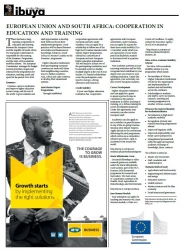European Union and South Africa : Cooperation In Education And Training2017-06-05 There has been a longstanding cooperation in education and training between the European Union and the Republic of South Africa. The European Commission is responsible for the running of the Erasmus+ Programme and the Intra-Africa academic mobility scheme. The European Commission manages the budget and sets priorities, targets and criteria for the programmes for education, training, youth and sport for the period 2014-2020.
Erasmus+ Erasmus+ aims to modernise and improve higher education across Europe and the rest of the world. It gives students and staff opportunities to develop their skills and boost their employment prospects. Good practices will be shared between universities and businesses in Knowledge Alliances. South Africa is a Partner Country in the Erasmus+ programme Higher education institutions from participating European countries can work with those from neighbouring countries, non-EU Balkan countries, Asia, Africa and Latin America to develop their educational systems. Joint Master Degree Programmes Through established cooperation agreements with European partners under Erasmus+ you can apply for a scholarship to follow one of the high-level Erasmus Mundus Joint Master Degree programmes, offered by a consortium of European and non-European higher education institutions. You will study in at least two of the participating institutions and be awarded a joint or double/multiple degree at the end of your studies. EU-funded scholarships cover the participation costs, travel to Europe, a living allowance and insurance. Credit Mobility If your own higher education institution has cooperation agreements with European universities, under Erasmus+ you can apply for a grant for short-term credit mobility (3 to 12 months), under which you can spend part of your study period (at bachelors, masters or doctorate level) at a partner institution. Your academic activities at your receiving institution will be fully recognised and contribute to your degree once you return to your sending institution. Under this agreement, your university can also receive European students. Career Development Higher education institution staff can apply for a grant to spend a period (5 days to 2 months) at this partner institution to deliver teaching or training, or to follow training for career development purposes. Under this agreement, your university can also receive European staff. Academics can also apply to act as scholars or guest lecturers in any of the on-going Erasmus Mundus Joint Master Degrees. Apply directly to the consortium delivering the joint programme, which carries out a competitive selection procedure, open to academics from around the world. http://eacea.ec.europa.eu/erasmus-plus/jointmasterdegrees Marie Skłodowska-Curie Doctoral fellowships or other research grants are available under the Marie Skłodowska-Curie actions, part of the EU’s Horizon 2020 framework programme for research and innovation. The main areas of cooperation continue to be Health; Food, Agriculture & Biotechnology; and Environment. http://eacea.ec.europa.eu/msca Jean Monnet Module Your institution can apply for teaching and research via a Jean Monnet module, a Chair or a Centre of Excellence. To apply, contact the Executive Agency (EACEA) in Brussels at: http://eacea.ec.europa.eu/erasmus-plus/actions/jeanmonnet_en Intra-Africa Academic Mobility Scheme The Intra-Africa academic mobility scheme is a new programme which funds:
https://eeas.europa.eu/delegations/southafrica_en |
European Union and South Africa : Cooperation In Education And Training
Copyright © 2024 KwaZulu-Natal Top Business
